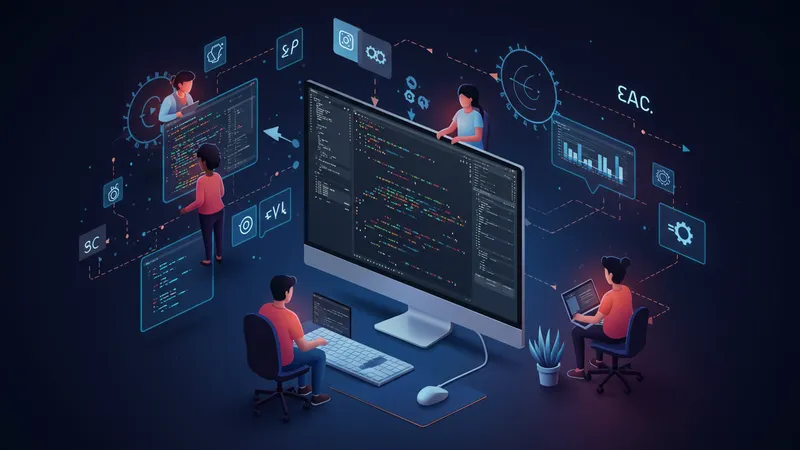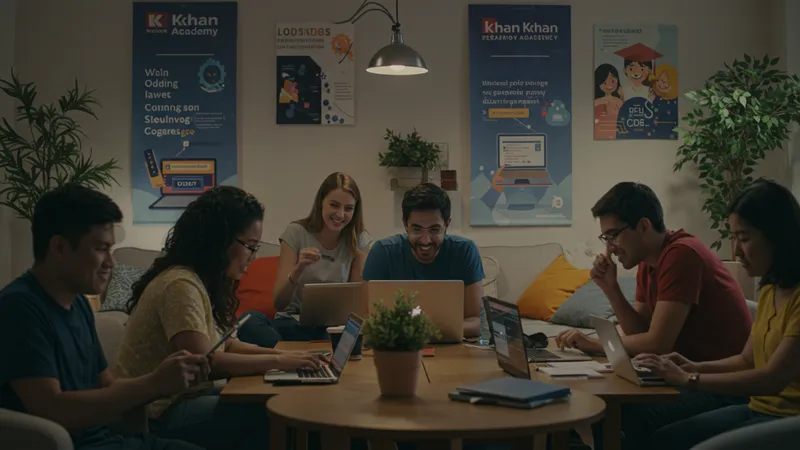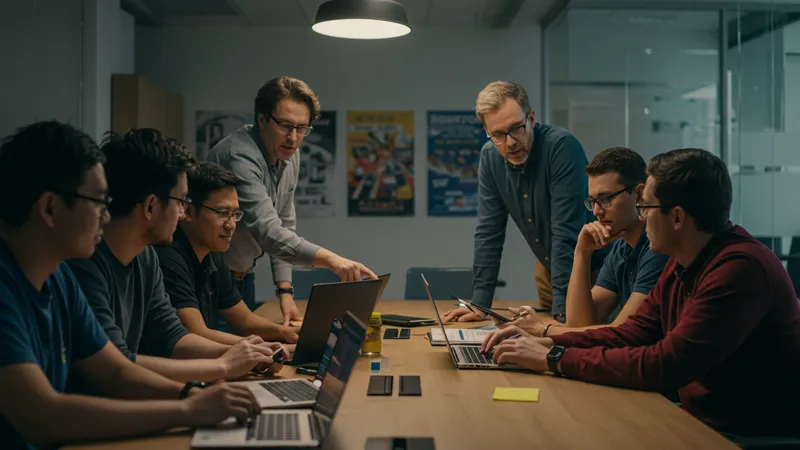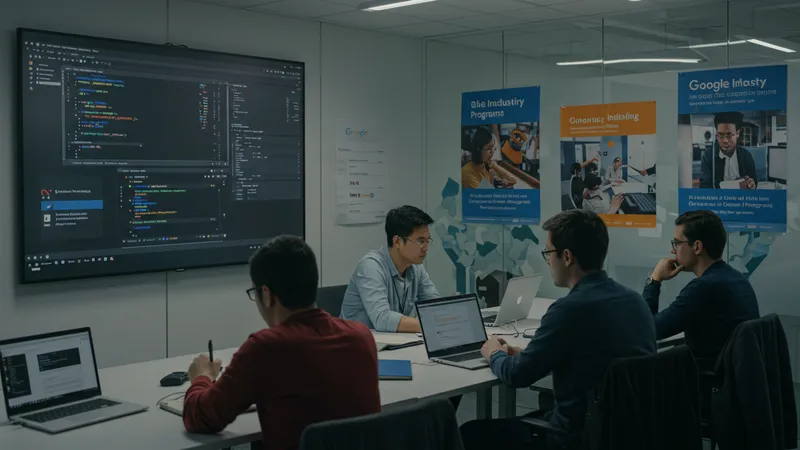

Have you ever wondered why some people can seemingly learn coding overnight while others struggle for years? The secret isn't IQ; it's about using the right resources.
In a world where coding skills are more sought after than ever before, discovering the perfect learning tool can set you leaps and bounds ahead. But what most people don't realize is that there are untapped resources that are completely transforming how we learn coding.

Shocking as it may sound, studies show that people who frequently change their learning resources often excel faster than those sticking to one platform. It's counterintuitive, right? But that’s not even the wildest part…
Equally surprising is the mental shift you undergo when you alternate between structured courses and real-world projects. This blend isn't just effective; it's revolutionary, transforming rookies into coding maestros faster than traditional education. But wait until you hear about the platform that's silently changing the game…
The platform we're going to discuss next has experts in awe with its unique approach. It doesn’t just teach you how to code—it rewires your brain to think like a programmer. What happens next shocked even the experts…
When it comes to learning online, Coursera isn’t just offering courses; it’s offering transformation. Often underestimated, its collaborations with Ivy League universities make it a powerhouse in delivering quality content. Most people overlook Coursera, thinking it’s just another platform. But did you know they’ve partnered with institutions like Stanford to mold their curriculum?

What many don’t realize is that Coursera integrates real-world applications into its lessons. This hands-on approach allows learners to build projects alongside experts, not just hear about theories. And here’s a little-known tip: students who study with Coursera often gain an edge in job interviews with credible certificates from recognized universities.
Beyond this, the cost-effectiveness blows the competition out of the water. Where else can you get access to lectures equivalent to a college degree for a fraction of the cost, right from your living room? Imagine gaining skills that companies crave, without the crippling debt!
But there’s one more twist to Coursera’s arsenal that even loyal users miss. Ready to dive deeper into the innovation that’s setting it apart from the crowd and breaking traditional learning boundaries? You won't want to miss what's coming...
While some may see Codecademy as just a beginner's guide, it offers much more beneath its polished surface. Known for its easy-to-follow interface, users often think it's just for novices. But dive deeper, and you’ll uncover its unexpected depth and complexity designed for advanced learners too!

A major insider tip is Codecademy’s use of real-world simulations in its Codecademy Pro. Learners engage not only with coding exercises but scenarios that mimic actual software development challenges. Users who invested in Codecademy Pro, priced at $39.99/month, report mastering multiple languages without the need for additional resources.
The platform also boasts a constantly updated library, ensuring students aren’t just coding—they’re staying ahead of industry trends. And if you thought all coding courses were the same, wait until you see how Codecademy’s AI features personalize learning paths, crafting an experience as unique as your own fingerprint.
Now, what you read next might change how you see Codecademy—and online learning—forever. Ready for another tech twist that’s reshaping the future of coding education?
You might not expect Udemy, with its vast array of courses, to offer something innovative. Yet, it's very structure as a diverse, crowdsourced platform is its strength. Instructors from around the world bring unique perspectives that you won’t find in any traditional classroom.

Many are unaware, but peer-generated ratings on Udemy are a goldmine for finding quality courses rapidly. By simply browsing top-rated lessons, you align your learning with the wisdom of thousands of previous learners. It's like having a guide through a jungle of endless possibilities.
And here's an unexpected benefit: the lifetime access factor. Once you purchase a course, you have it forever. That means any updates, improvements, or additional content are yours at no extra cost. It’s a continual source of knowledge at a fraction of conventional schooling prices!
There’s a catch though—sorting through Udemy’s courses can be overwhelming if you don’t know what to look for. But don’t worry, the next section will arm you with secrets to maximize your Udemy experience beyond imagination!
Who says you need to break the bank to learn how to code? It's time to shatter that myth. There is a world of free coding resources at your fingertips that fly under the radar, believed to be inadequate, yet surprisingly robust.

Khan Academy, for instance, offers one of the most coherent, accessibly free platforms available. Its reputation for excellence in science and math transfers seamlessly to its computer science courses. You can transform your coding foundation drastically without spending a dime.
Have you heard of freeCodeCamp? Not only does it offer structured curriculum free, but it also provides pathways to real-world project development, enhancing your portfolio. The real kicker is the supportive global community ready to help at every step.
Looking for even more ways to capitalize on no-cost options? What we uncover next will redefine how you tap into these invisible educational gold mines.
The world of programming can feel exclusive. Still, open-source platforms are working tirelessly to change that. They invite everyone, regardless of background, to contribute and learn collectively. This isn't just a tech movement—it’s a culture shift.

Platforms like GitHub are more than repositories. They are communities where budding developers can engage in real projects, gaining skills that textbooks could never offer. Did you know that employers actively seek candidates familiar with open-source projects?
Git and GitHub resources show a startling dynamic that nurtures improvements. New learners can jump into progressive development builds, gaining firsthand experience of coding in action rather than through simulations.
But hold on! Are these resources truly for free, and do they provide actual employable skills? What comes next is surprising evidence of their untapped potential, challenging the limits of traditional education paths.
Massive Open Online Courses (MOOCs) are rapidly reshaping how people access higher education. Their promise isn’t only flexibility but a reinvented gateway into quality content from top institutions worldwide.

This evolution is marked by platforms such as EdX, where MIT and Harvard bring premier educational content right to your screen. Historically viewed with skepticism, MOOCs now boast completion rates that defy naysayers.
Incredibly, MOOCs allow you to audit courses for free, offering knowledge without the price tag. The catch? Certification often requires a fee, but it’s a bargain for the skills and networks you gain.
If you thought that was the extent of their capability, brace yourself for insights that showcase how MOOCs surprisingly outperform traditional colleges in specific areas. Intrigued? There’s much more to this story!
No laptop? No problem. The impact of mobile applications on coding education is soaring. Previously dismissed as supplementary, they are fast becoming primary learning tools.

SoloLearn is an app-based learning environment offering courses from basic HTML to complex Python, all at your fingertips for free. It’s self-paced and widely acclaimed for its challenges that gamify the learning experience.
The greatest surprise lies in user engagement metrics. Mobile learners often report higher persistence in their studies, thanks to the convenience and instant accessibility of platforms like Mimo, which convert commuting time to learning moments.
What’s hidden in the fine print of mobile coding applications is their innovative use of push notifications and social links that hook users in. Next, we'll reveal how leveraging these tools can make all the difference in your journey to becoming a proficient coder.
Despite the obvious gender imbalance in tech, women-focused coding programs are emerging rapidly, creating essential pathways that were once unseen. Initiatives like Women Who Code provide community and empowerment.

A pivotal revelation is how these networks aren’t just about skill but fostering a supportive culture where women thrive. It's an ecosystem that encourages, mentors, and champions diverse perspectives in typically male-dominated spaces.
The beauty of these programs lies in their emphasis on real-world application, equipping women with skills that align with current industry demands and influence the coding landscape more than you might expect.
But, what’s next could be the biggest surprise—programs that show insight into how these communities are redefining norms across sectors and ultimately how tech companies across the globe are responding.
Beyond just a resource, mentorship stands out as an underrated powerhouse in the coding world. Personal guidance can bridge learning gaps and provide invaluable insights that books and courses cannot.

The notion that mentorship should be an exclusive privilege is rapidly dissolving. Networks like CodeMentor allow anyone to seek expert advice effortlessly. The relationships forged here often lead to collaborative opportunities and real-world insights.
A surprising finding from mentor-driven learning is the markedly increased retention rate among students. Those guided by mentors have astonishing 70% higher success in complicated projects.
But there's a quirk you may not expect. Some tech giants quietly attribute part of their workforce success to external mentorships. Unpacking why mentorship is so profoundly transformative is next!
Striking the right balance between online and offline learning can supercharge your coding journey. This blended approach utilizes the strengths of digital resources while retaining tactile and personal interactions.

Think local coding bootcamps—when paired with online learning like Codecademy's vast libraries, they create enriched paths that accelerate understanding. This isn't just theory; graduates of hybrid programs demonstrate a deeper comprehension.
The interplay between workshop settings and vast online resources means you benefit from face-to-face networking while honing self-paced studies. These hybrid models buck the notion that you must choose one over the other.
The last bit of this puzzle is how institutions are adopting blended methodologies, yielding results that defy traditional statistics. Want to know what's dramatically shifting within educational systems? The revelations continue!
Amidst the coding frenzy, data analysis remains a silent thunder, amplifying learning in profound ways. An understanding of data can fine-tune programming skills, often unlocking new career paths.

Platforms like DataCamp provide a unique edge, offering content that's not just about learning to code but mastering data intricacies. Their purpose is twofold: equip coders with analysis skills and prepare them for data-driven roles.
What’s intriguing is how combining coding with data fluency creates developers who solve problems more innovatively. Here’s the kicker—certain curricula now incorporate a 'data thinking' model equivalent to learning a new language!
There’s more to this than meets the eye. How data integration is morphing into an educational standard opens up unexpected avenues for future programming specialists. What might this mean for traditionalists? There's only one way to find out…
A surprising trend in the tech industry sees companies taking education into their own hands. Corporations aren’t just hiring developers; they’re cultivating them through internal programs tailored to specific industry needs.

These initiatives allow employees to learn precisely what their roles require, aligning with real-world applications. What’s truly game-changing is that companies like Google have started offering credentials that hold equivalent weight to college degrees.
Not only does this reshape employment landscapes, but it also opens doors to learners with non-traditional backgrounds who previously lacked means or access. Salaries rise along with skill levels as these paradigms gain traction.
Do these corporate classrooms signal an end to traditional four-year institutions as we know them? The evolving landscape beckons a closer look—and what's uncovered next could alter education as we expect it today.
In a world constantly evolving, the act of learning coding and programming isn't just a technical pursuit—it's reshaping the educational landscape. These advanced resources, whether through MOOCs, corporate initiatives, or powerful online platforms, are more than tools; they are keys to untapped potential and career reinvention.
The future belongs to those who adapt and learn dynamically. We’re witnessing a true transformation, but this is merely the cusp of an educational revolution. Ready to dive in further? Share this article, bookmark these discoveries, and lead your peers toward a brighter, code-fluent future!